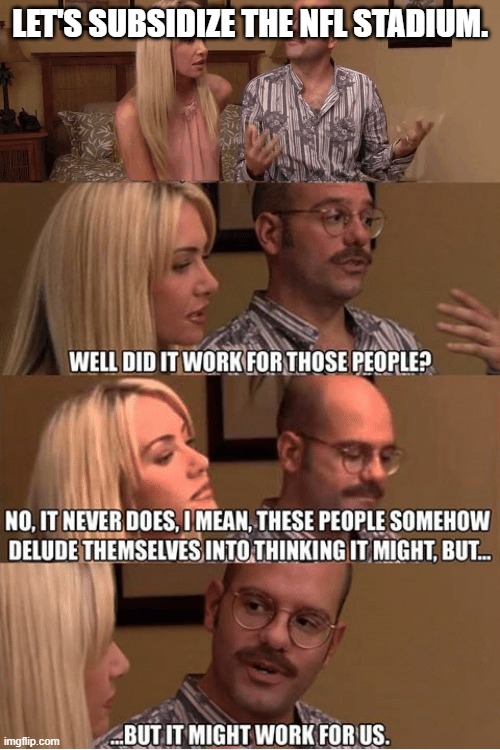NFL Commanders building $3bn new stadium in Ward 7 on the old RFK site
Anonymous
From the Post article: “an expanded recreation district, where the District plans to build an $89 million SportsPlex next to the Fields at RFK.” |
Anonymous
|
Anonymous

|
Anonymous
| This has turned every sports bro into an economist and GGW into a bunch of NIMBYs. |
Anonymous
let me guess...they say "NeEdS mOrE hOuSiNg", while ignoring the fact that a whole neighborhood is going to be built that was never going to exist otherwise |
Anonymous
Nobody's opposing a new neighborhood. The question is whether there will be a huge stadium and even larger parking lot displacing thousands of additional units of housing that could be built in that neighborhood. Developers will be eager to build either way. |
Anonymous
Not when you are talking about capital budgets versus operational funds. |
Anonymous
Thanks for literally proving my point. Letting the perfect be the enemy of the good... |
Anonymous
The reason it works for DC is because most of the people coming to games are from out of the city, so it is a transfer of entertainment dollars from VA and MD to DC. It works for the Nats and Capital One (MCI Center/Verizon Center, whatever) because between them, it is about 300 events a year. This stadium would only be a financial success if there are enough concerts and other events located there, in addition to NFL football - so how many international soccer, concerts, NCAA tournament etc can be scheduled annually? If it isn't more than 20-30 over and above the football, then it will be a boondoggle. |
Anonymous
With the exception of Congressional interference, the city has a AAA bond rating. So wall street disagrees with you. |
Anonymous
Yep. Also, none of the old studies about a stadium's ROI is referencing the new style of stadium development: private spending to build not only a stadium but a some public spending for a district around it that also provides some economic return (to both the city and the team). Simply put, developing the area around the stadium (either for residential, or commercial/entertainment) is the only way these days to get a project of this size off the ground (for both political and economic reasons). |
Anonymous
This is juked / fake data because of the alleged “$4 billion” total cost. |
Anonymous
DP. The capital budget is generally funded by bonds. The operating budget is used to pay for debt service on the bonds unless they’re special tax bonds in which case they have a dedicated revenue stream associated with them. Even for special tax bonds, DC could choose to obligate that revenue stream to something else. Short version: General obligation bonds are paid for using general tax revenue, leaving less tax revenue available for operating expenses. Special tax bonds are tied to a specific revenue stream but the council decides how the proceeds of the bond auction may be spent. Even shorter version: Money is money. |
Anonymous
You failed economics, didn’t you? |
Anonymous
That doesn’t answer the question as to why a new Metro stop is needed. It isn’t. |
